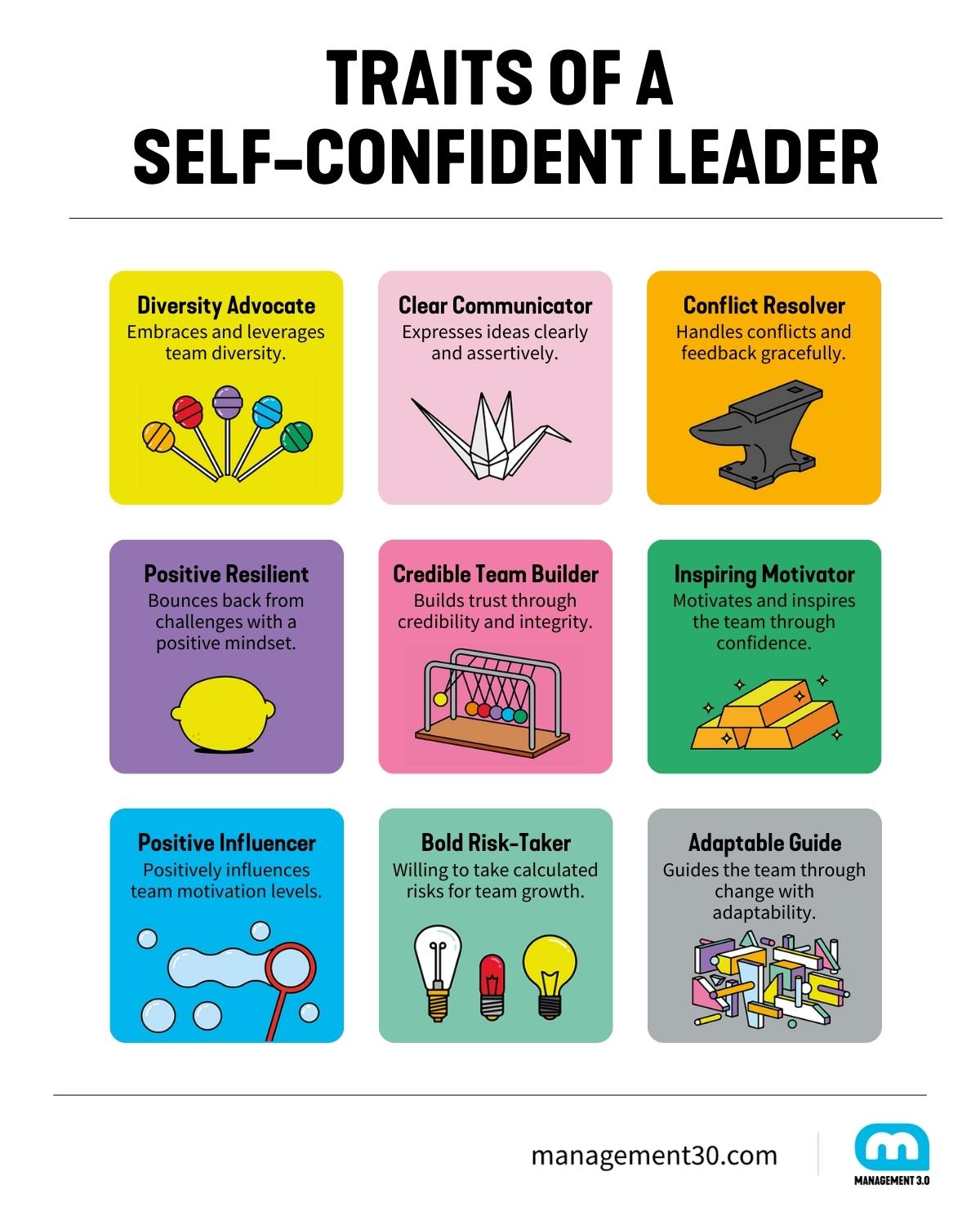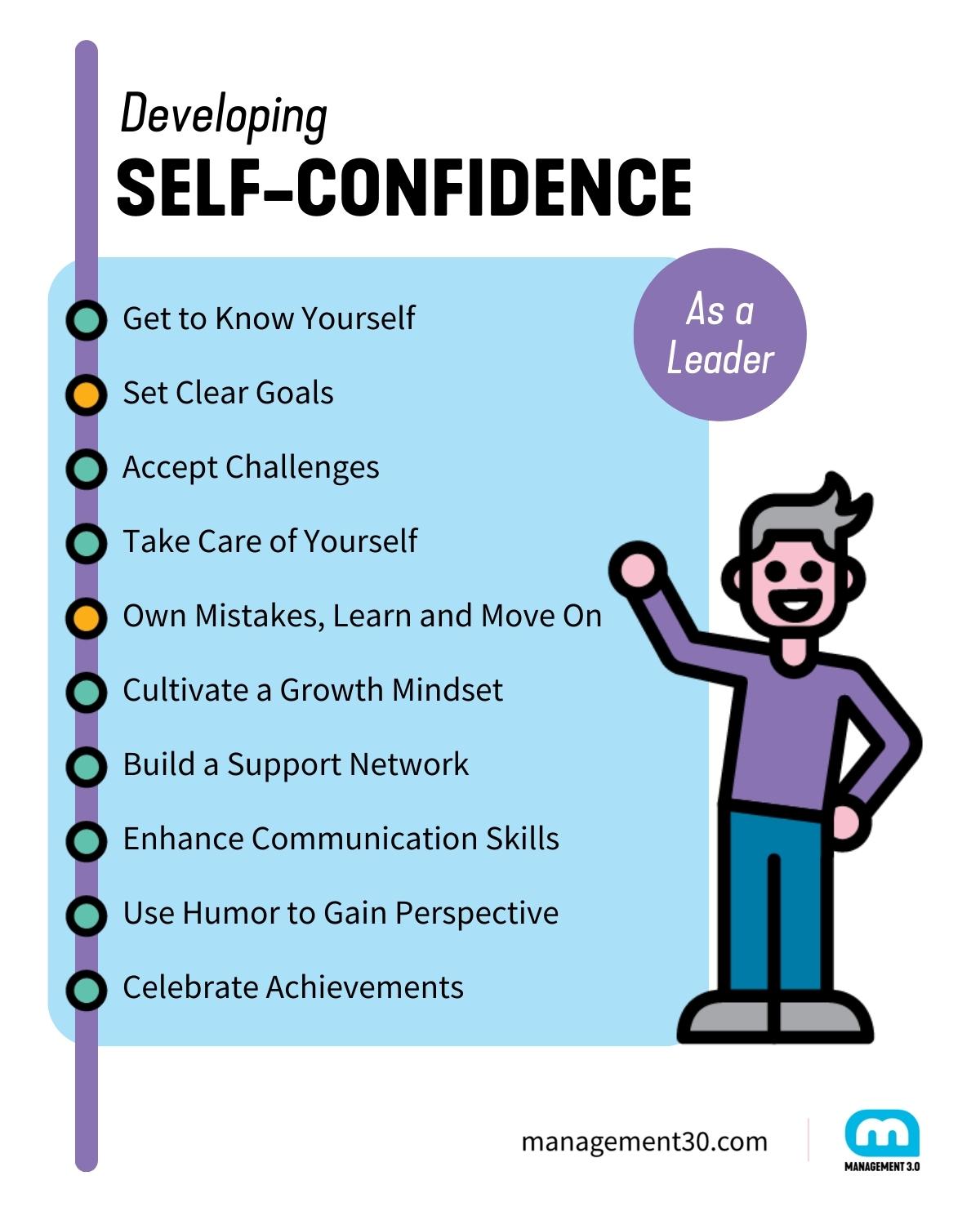In leadership, self-confidence is a transformative force, empowering leaders to embrace diversity, communicate assertively, handle conflicts gracefully, and inspire resilient teams. It fosters credibility, motivates others, and enables leaders to take calculated risks, adapting to change effectively.
But what does it take to develop self-confidence as a leader, and how can Management 3.0 help with this?
When I turned 26, I got a promotion to lead a team. I worked in a big company that operated in four different countries. I became the Head of Talent, in charge of 25 consultants who found people for jobs in different places.
Even though I was grateful for the promotion, my head was spinning round from time to time: Was I really the right person for the job? Was I too young? Did I have the right skills and knowledge? It was a big test for my confidence as a leader.
I was fortunate to have a team that was open and worked well together. A leader, like a mentor, helped me through tough times and doubts, creating a strong support system. This mentor reminded me to believe in myself and my abilities. Confidence was crucial when dealing with clients, presenting ideas, making a good impression, and doing good work. The key was to trust what I knew I could do.
Celebrating small wins became a regular thing, boosting my confidence. Clear goals and a positive mindset guided me, helping me learn and grow. I wondered if I could handle the responsibility, but each small success made me more confident and better prepared for challenges.
Of course, the journey had its mistakes, even with clients. But I learned that giving up wasn’t an option. Moving forward meant learning from mistakes, being resilient, improving communication skills, and growing through experiences.
In leadership, confidence is often challenged by Imposter Syndrome. However, in my story, it became the force that kept me going, one small victory at a time.
Now, you might be wondering how I developed confidence as a leader and became as strong as I am today. In this article, I explore the importance of self-confidence in leadership and how Management 3.0 can assist you in becoming a confident leader.
An article by Management 3.0 Facilitator Lúcia Palma from Portugal.
What Does Self-Confidence Mean?
Self-confidence is the belief that a person has in their own abilities, skills, or capabilities. Above all, it is an internal conviction about what we are capable of, what challenges we can overcome, and the goals we are willing to achieve.
This is also an important ability to define how we perceive ourselves. This point immediately links us to emotional intelligence, as self-confidence is related to the dimension of self-knowledge.
Self-confidence is not self-esteem. Self-confidence is a judgment of our capability, how much we think we can do something; self-esteem is a judgment of self-worth, how much we like ourselves. (Hollenbeck & Hall)
Importance of Self-Confidence as a Leader
Effective leadership requires a balance of technical skills, emotional intelligence, and often overlooked, self-confidence. Self-confidence fosters a positive self-view, empowering leaders to take risks, persevere through challenges, and manage stress effectively. Importantly, it acknowledges that setbacks and doubts are part of the journey, highlighting the transformative power of vulnerability and authenticity.
In leadership, self-confidence extends beyond personal positivity; it involves the ability to confront challenges, make tough decisions, and inspire others to follow suit. It serves as a guiding force through complexities, emphasizing the importance of authenticity in the leadership journey.
Self-confidence emerges as a crucial skill in the global work environment, positively impacting employee attitudes and performance. A survey revealed that an impressive 93% of professionals worldwide consider self-confidence a crucial factor for success in the job market. This perception reflects the widespread understanding that self-confidence not only resolves professional challenges but also contributes to effective communication, assertive decision-making, and leadership capacity. In today’s highly competitive environment, self-confidence is not just a personal quality but a professional competence that can differentiate individuals and propel their careers to success.
The Impact of a Self-Confidence in Leadership
Self-confidence in leadership is not just a personal attribute; it’s a catalyst for creating a positive, resilient, and high-performing team.
- Enhanced Ability to Lead Diverse Individuals
Self-confidence allows leaders to embrace and leverage diversity within their team. It fosters an inclusive environment where differences are seen as strengths rather than obstacles.
- Improved Communication Skills and Greater Assertiveness
Self-confidence empowers leaders to express themselves clearly and assertively. This clarity in communication helps in conveying expectations, goals, and feedback effectively. When leaders are confident in their message, the team is more likely to understand and align with the vision.
- Reduced Conflicts and Heightened Capacity for Feedback
A self-confident leader is better equipped to handle conflicts and criticism gracefully. Instead of being defensive, they can objectively evaluate feedback, turning potential conflicts into opportunities for growth. This creates a positive team dynamic built on openness and improvement.
- Increased Resilience in the Face of Challenges
Self-confidence acts as a shield during challenging times. Confident leaders are more resilient, bouncing back from setbacks with a positive mindset. This resilience not only benefits the leader but sets a resilient tone for the entire team, fostering perseverance in the face of difficulties.
- Establishment of Credibility and Integrity
Self-confidence is closely tied to authenticity and integrity. A leader who believes in their abilities and principles becomes a trustworthy figure. This credibility is essential for building strong, ethical relationships within the team and ensuring that actions align with words.
- Inspiration to the Team
Leaders with self-confidence inspire those around them. Their conviction in the team’s capabilities and the shared vision motivates team members to give their best. This inspiration creates a positive and dynamic work environment.
- Positive Influence on Motivation Levels
Self-confidence is contagious. When leaders radiate confidence, it positively influences the motivation levels of the team. Team members are more likely to embrace challenges, set higher goals, and stay committed when they witness a confident leader leading by example.
- Willingness to Take Calculated Risks
Confidence enables leaders to step out of their comfort zones and take calculated risks. Whether exploring new strategies or innovations, a self-confident leader is more likely to make bold decisions that can lead to positive outcomes, driving growth and progress.
- Greater Adaptability to Change
In a fast-paced world, adaptability is crucial. Self-confident leaders are more open to change and can guide their teams through transitions effectively. Their belief in their ability to navigate uncertainties fosters a culture of adaptability within the team.

Strategies to Develop Self-Confidence as a Leader
Developing self-confidence is a continuous process. See it as a lifelong task with different stages, goals, changes, and objectives to achieve along the way.
Some ways to develop self-confidence as a leader:
- Get to Know Yourself
Reflect on your strengths and areas for improvement. Recollect your achievements, pivotal moments, and challenges you’ve conquered. Draw inspiration from these experiences during challenging times.
- Set Clear Goals
Utilize the OKR system to define clear, inspiring, and measurable objectives and key results. Explore the Agile Change Leadership Workshop or the Agility in HR Workshop learning more about OKRs and goal setting.
- Accept Challenges
Step out of your comfort zone to take on challenges that facilitate learning and personal growth.
- Take Care of Yourself
Taking care of your physical and mental well-being is crucial for building confidence. Ensure you get enough rest, exercise, and engage in activities that bring you joy.
The 12 Steps to Happiness highlight twelve areas to focus on in the pursuit of happiness. For leaders to enhance self-confidence, actively participate in these activities and create an environment for your team to also explore and embrace these steps.
- Own Mistakes, Learn and Move On
Assume responsibility for your mistakes and, crucially, learn to move forward. Allowing mistakes to overpower you is a rapid path to losing confidence and reducing productivity, both individually and within a team. While it’s natural to be concerned about mistakes, dwelling on them excessively can result in burnout, depression, and various mental and physical issues. It’s beneficial to worry about mistakes, but it’s even more essential and constructive to focus on overcoming and learning from them.
- Cultivate a Growth Mindset
Foster a mindset that sees challenges as opportunities for growth and learning.
- Build a Support Network
Strengthen your resilience by cultivating a support network, whether through family, friends, or colleagues. Establish meaningful relationships.
In the Management 3.0 Community, you’ll find the accountability, support, and tools to help you become the leader you want to be. It’s your safe space to learn and practice with others. Moreover, you’ll get judgment-free support to apply your learnings to your leadership challenges.
- Enhance Communication Skills
Work on improving your communication skills to effectively convey ideas and connect with your team.
- Use Humor to Gain Perspective
Employ a sense of humor, even in challenging situations, to gain perspective and maintain a positive outlook.
- Celebrate Achievements
Acknowledge and celebrate both small and significant achievements. These victories serve as fuel for future successes.
To celebrate achievements with your team and demonstrate authenticity and vulnerability as a leader, utilize the Celebration Grid. This practice enables the leader, along with the team, to comprehend what they have learned or not in each phase of the process, in each failure, and in each victory or successful work.
The Celebration Grid should be applied with an open, flexible, and curious mindset, enabling the leader and the entire team to honestly analyze their progress and setbacks in the process. This approach creates unique experiences even when everything has gone wrong, strengthening bonds of trust and fostering a culture of continuous learning within the team.

Book Recommendations for the Self-Confident Leader
Some books that helped me develop self-confidence as a leader, and that I recommend to all those who want to improve their skills. I used these books as a basis for my article:
- The Power of Self-Confidence by Brian Tracy
- No Excuses!: The Power of Self-Discipline by Brian Tracy
- Leaders Eat Last by Simon Sinek
- The Power of Habit: Why We Do What We Do in Life and Business by Charles Duhigg
Yes, the journey of developing self-confidence is dynamic and requires a commitment to continuous learning and improvement. Invest in your personal and professional development, employing these strategies to cultivate lasting self-confidence as a leader.
Remember that developing self-confidence is a personal process, a path without rules, which each person must follow in their own way. It involves the development of specific skills, the celebration of past successes, the establishment of realistic goals, and the promotion of a positive mindset. It’s a lifelong process, so be kind and patient with yourself!

